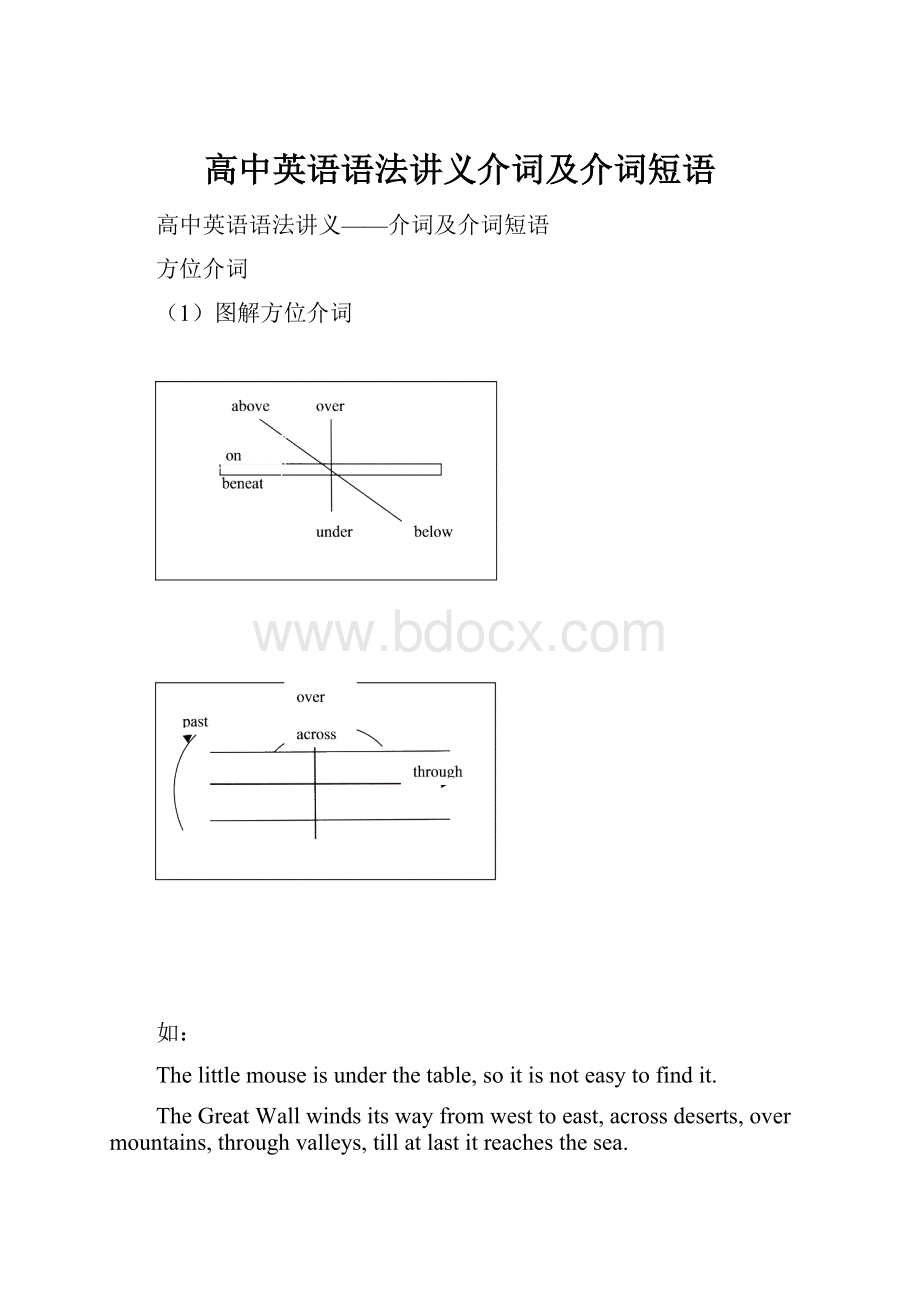高中英语语法讲义介词及介词短语.docx
《高中英语语法讲义介词及介词短语.docx》由会员分享,可在线阅读,更多相关《高中英语语法讲义介词及介词短语.docx(38页珍藏版)》请在冰豆网上搜索。

高中英语语法讲义介词及介词短语
高中英语语法讲义——介词及介词短语
方位介词
(1)图解方位介词
如:
Thelittlemouseisunderthetable,soitisnoteasytofindit.
TheGreatWallwindsitswayfromwesttoeast,acrossdeserts,overmountains,throughvalleys,tillatlastitreachesthesea.
用介词完成句子:
1.Thesunlightcamein_______(穿过)thewindowsintheroofandlitupthewholeroom.
2.Thebicycleis_______(不能)repair.
(2)among,between
一般来说,among用于三者及以上的“在…中间”,其宾语通常是一个表示笼统数量或具有复数(或集合)意义的名词或代词;而between指两者之间,其宾语常为表两者的名词或代词,或是由and连接的两个人或物。
among在表示范围时,还可表示“在(其)中,…之一”。
如:
Theyhidthemselvesamongthetrees.
Sheistheyoungestamongthethreesisters.
Therewasafightbetweenthetwoboys.
I’musuallyfreebetweenTuesdayandThursday.
注意:
在下列情况中,between可用于三者:
1当两个以上的人或物用and连接时。
如:
betweenA,B,andC在A、B和C之间
2涉及人或事物之间的区别以及人或事物之间的关系时。
如:
thedifferencebetweenthethreeofthem
therelationsbetweenvariouscountries
3表示“由于…合作的结果”时。
如:
Betweenthemtheylandedthefish.
4在divide,share等表示“分享”之类的动词之后,若接一个表示三者或三者以上的复数名词时,用among和between均可。
如:
Hedividedhismoneyamong/betweenhisfiveones.
用介词between,among填空
3.Somestudentsoftenlistentomusic_______classestorefreshthemselves.
4.FourChinesemodelswere_______the14peopleawardedprizesonFridayatWorldSupermodelCompetition.
(3)in,on
两者均可表示“在…上”,on侧重表面接触,in侧重接触的深度。
若打击某人的脸、眼、嘴、
胸腹等部位用in,而打击头、额、鼻、耳、颈、肩、腿等部分用on。
表示树本身生出来的
枝、叶、花、果等用onthetree,但在树本身以外的人或动物“在树上”,用inthetree,意指
被枝叶遮掩其中。
如:
Wefoundasquareholeinthewall.
Theteacherpattedtheboyontheheadandcomfortedhim.
Therearelotsofapplesonthetree.
用介词in,on填空
5.Thereisamapoftheworld______thewall.
6.Birdsaresinging______thetree.
(4)across,through
均可表示穿过,但across与on有关,意为:
fromonesidetotheothersideofsth,表示动作
在物体的表面进行,从一边到另一边。
through与in有关,表示动作从物体中间穿过。
比较:
Hewalkedacrossthefield.(在田野上)Hewalkedthroughtheforest.(在森林中)
Heranacrossthebridge.(从桥上)Heranthroughthetown.(贯穿)
此外,across与静态动词连用时表示“在(街、河等)…对面”或“在(身体某部位)上”的意思。
如:
Theschoolisacrosstheriver.
Hehasagiantscaracrosshischest.
用介词across,through填空
7.Myhouseisjust______thestreet.
8.Waterwillbepumped______apipe.
9.Doyouthinkthisshirtistootight______theshoulders?
(5)over,above,under,below
1)over和above都有“在…之上”的意思,但over表示“在…的正上方”,其反义词为under,而above表示“在…的斜上方”,其反义词为below。
over还可可表“(部分或全部覆盖)在…上面”的意思。
如:
Youcan’twearabluejacketoverthatshirt.It’lllookterrible.
2)over和above都可以表示在数量上“多于”的意思,但above一般用于表示与“最低限度”或“标准”有关的事物,而over则表示“多于”,相当于morethan,其反义词是under(=lessthan)。
如:
1000metersabovesealevel.
twodegreesabovezero
He’soverfifty.
It’sunderamilefromheretothepostoffice.
3)above表示“级别、地位、重要性等高于…”,over则强调“控制、掌握、权威、优越”等。
如:
Healwaysputshisstudentsaboveeverything.
Hehaslittlecontroloverhisemotions.
用介词over,above填空
10.She’sbeenherefor______twohours.
11.Agreatpersonisalwaysputtingothers’interests______hisown.
12.Heis______averageintelligence.
(6)in,on,to,off
四个都可表示两地之间的方位关系。
in表示在范围之内;to表示在某范围之外;on表示“毗邻”、“接壤”;off则强调两地间隔着一小段距离。
如:
ShanghaiProvinceis/liesintheeastofChina.
ShandongProvinceis/liestothenortheastofHubeiProvince.
Russiais/liesonnorthofChina.
LilylivesinaflatjustoffBridgeAvenue.
用介词in,to,off填空
13.Japanis/lies_______theeastofChina.
14.Beijinglies_______thenorthofChina.
15.TheWellHotelstandsinaquietplace_______themainroadatthefarendofthelake.
时间介词
(1)at,in,on
1)at的用法
①表示时间的一点,时刻等,如:
at12:
00,atnoon,atnight,atmidnight,atdawn/daybreak,atsunrise/sunset,atdusk
②表示较短暂的一段时间,可指某个节日或被认为是一年中标志大事的日子,如:
atChristmas
2)in的用法
表示在某段较长的时间内(如:
世纪、朝代、年代、月份及泛指上午、下午和傍晚等),如:
inthe1980’s/1980s,intheQingdynasty,inOctober,inthemorning/afternoon/evening。
3)on的用法
①用于表示具体的日子或一个特定的时间(如:
某日、某节日、星期几等),如:
onOctoberthefirst,onarainyday,onNationalDay等
②用于表示特定的上午、下午或晚上,如:
onChristmasEve,onthemorningofJanuarythethird,ontheafternoonofhisarrival等。
③准时,按时:
ontime
翻译下列词组
16.在星期天上午_______________________
17.在三月初________________________
18.在儿童节________________________19.在19世纪________________________
(2)in,after
1)in的用法
in表时间,常表示“在…之内/后”,但表示此意时,必须具备两个条件:
1.所在句子的谓语动词必须表将来;2.后面必须是一段时间。
这两个条件缺一不可,否则用after或later。
2)after的用法
after表时间,意为“在…之后”。
通常“after+时间段”与过去时连用;“after+时间点”与将来时连用。
如:
Myfatherwillbebackinthreedays.
Myfatherwillbebackafterthreeo’clock.
Myfathercamebackafterthreeafterthreedays/threedayslater.
用in,after,later填空
20.Itwillbefinished______anhour.
21.Hereturned_______afewdays.
22.Theyfinishedtheirlessonsatfourandalittlewhile_______theywentouttotakeawalk.
(3)for,from,since
for后接时间段,表示行为或状态持续了多久;from后接时间点,表示行为或状态的起始点,而不涉及其持续时间的长短;since后接时间点,不仅表示行为或状态的起始点,而且还强调该行为或状态从起始点一直持续到说话时刻,因而常与延续性动词的完成时连用。
Mr.Brownenjoyedthecountrylifeandlivedthereforalmostfifteenyearsafterhisretirement.
Myyoungersisterbegantolearndancefromtheageoffive.
Tomhasbeendoinghishomeworksinceseveno’clock.
用for,from,since填空
23._______thenonsheknewshewouldwin.
24.IlostmymoneyandIhavebeenworried_______then.
25.Themeetinglasted_______threehoursyesterday.
(4)during,through,over
1)during的用法
during指某个动作或状态在某个时间段里或整个过程中断断续续地发生过多次,或在整个时间段里的某一点发生过,起止时间比较明显。
如:
Heoftenfallsasleepduringtheclass.
Heswimseverydayduringthesummer.
2)through的用法
through:
在…期间;从…开头到结尾(所指时间包括在内,此时与throughout相同)。
如:
Tomboreupwellunderthestrainofsupportinghisfamilythroughhisfather’sillness.
3)over的用法
over意为:
whiledoing,having,eating,etc.(sth)在(做)…期间。
如:
Wehadapleasantchatoveracupoftea.
此外,over还有“throughout(aperiod)贯穿(一时间段)”的意思,等于during。
如:
HewillstayinWalesover/duringChristmasandtheNewYear.
用during,over填空
26.Let’sdiscussit_______lunch.
27.________thepast10years,greatchangeshavetakenplaceinthisarea.
(5)before,by,till,until
1)before的用法:
早于;在…之前。
如:
Thenewroadwillbecompletedbeforetheendoftheyear.
2)by的用法
①表示“到…止,不迟于…”。
如:
Allofyouaretoarriveatschoolbyseveno’clock.
②表示“在…期间,在…时间内”。
如:
Heworkedbynightandsleptbyday.
3)until和till的用法
①until是比较正式的用法。
在肯定句中和延续性动词连用,表示动作一直持续到until后面的时间为止;在否定句中和非延续性动词连用,表示该动作直到until后面的时间才开始。
Ishallwaituntilteno’clock.
Ididn’tgotosleepuntilmidnight.
②till意义与until相同,但不用于句首。
Heworksfrommorningtillnight,dayafterday.
用before,by,until填空
28.We’llhavefinishedthework______teno’clocktomorrow.
29.Iusuallytakeabath_______havingmybreakfast.
30.Up______lastyear,theydidn’tevenownacar.
表工具、手段、方式的介词
(1)by,in,on
三个词都可以表示旅行的方式。
1)不涉及交通工具的名词时用by,名词前不带冠词。
如:
bysea,bywater,byland,byair等。
2)涉及交通工具的名词时用by,但名词需用单数,其前面不加冠词和任何修饰语。
如:
bybike,bytaxi,byplane,byship/boat,bytrain,byspaceship等。
3)当旅行方式涉及特指的交通工具时,用on或in,名词前应有冠词、物主代词、指示代词等修饰语。
如:
traveltoNewYork,inthisplane,gotoschoolonmybike等
注意:
步行、骑马、骑骆驼用on。
如:
onfoot,onhorseback/onahorse,onacamel等。
同义句转换
31.HewenttoBeijingbycar.HewenttoBeijing______________.
32.Iprefertotravelbyship.Iprefertotravel_______________.
(2)with,in
1)with用于有形的工具或身体某些器官之前,其后的名词多被冠词、物主代词等修饰。
如:
Theydiggingwithapick/spade.
Weseewithoureyes,hearwithourears,andwalkwithourlegs.
2)in加原料、颜料、语言、钢笔、铅笔、大/小写字母
PleaseanswermeinEnglish.
Pleasewriteincapitalletters.
Theartistwroteinink/pencil(=withapen/apencil).
3)注意以下固定短语:
on/overthetelephone/radio
用这/那种方式:
inthis/thatway,bythis/thatmeans
withthis/thatmethod
用by,over,in,on填空
33.Thisformistobefilledin_______ink.
34.Thistoyisnotmachine-made.Itismade_______hand.
35.InthemorningIusuallylistentothenews_______theradio.
表原因的介词
(1)with多用于表示情绪的形容词或身体动作或状态的动词之后,表示某种心理或心理状态的原因。
(2)for多与表示情感的抽象名词或动名词及reason,famous等词连用。
(3)from常接抽象名词,表示自然或间接原因。
(4)of用于某些形容词后,后接与情感相关的人或事。
(5)over常用于带有感情色彩的动词,如cry,quarrel,laugh,sigh等词之后,叙述所发生事情的原因。
如:
Herfacewentredwithanger.
TheWestLakeisfamousforitsscenery.
表示支持、反对的介词
against意为“反对”,指在观点或主张等方面与某人采取对立的态度。
此外,against还有“倚靠,逆着,相反,在…的衬托下,与…比赛”等意思。
for指在观点或主张等方面与某人采取一致的态度,意为“支持,赞成”,与infavorof同义。
如:
Areyoufororagainstthenewroadscheme?
Shewasforcedtomarryagainstherwill.
That’sagainstthelaw.
Theskier’sredclothesstoodoutclearlyagainstthesnow.
介词填空:
36.Anagreementseemstobeimpossiblebecausethemajorityofthecommitteemembersare________it.
37.Tired,Jimwasfastasleepwithhisback_______abigtree.
其他常考介词
(1)besides,expect,but,otherthan,exceptfor的区别
1)用于否定句时,besides,expect与but可相互替换。
如:
Nootherstudentspassedthedifficultmathsexamexpect/besides/butLinTaoandWuDong.
2)用于肯定句时的区别
①expect意为:
notincluding除…之外(不再有)。
WeallpassedtheexamexceptTom.
②besides意为:
inadditionto.如:
Wehavelotsofthingsincommonbesidesmusic.
注意:
besides在句中的位置较灵活,可放句首也可放句中;而except多放在句中。
此外,except前几乎总有all,any,every,no及其复合词。
如:
Heansweredallthequestionsexceptthelastone.
Ihaveafewfriendsbesidesyou.
③exceptfor表示“除了…”之意,它所叙述的事实或细节部分用来修正句子的主要意思。
如:
Thecompositionisgoodexceptforafewspellingmistakes.
Yourcoatisgoodexceptforitscolor.
注意:
当except位于句首时,后面要加上for
Exceptforthis,everythingisingoodorder.
3)当except和but/otherthan都可接名词、代词、动名词,可以互换,但except后接副词、介词短语、when从句等时,but/otherthan不可替换except。
Hehasalwaysbeeninhighspiritsexceptrecently.
Thewindowisneveropenedexceptinsummer.
HehasalwaysbeenbusyexceptwhenitisSunday.
4)but,except后都可接that从句作宾语。
如:
Iaskednothingfromhimbut/exceptthatheshouldwritetomeeveryotherweek.
5)以上讲了besides作介词的用法,此外besides还可作为副词表“inaddition;also;
moreover;furthermore(而且,还有)”。
如:
Idon’twanttogo;besides,Iamtootired.
Thisismybestsuit;besides,Ihavetwoothers.
用except,exc